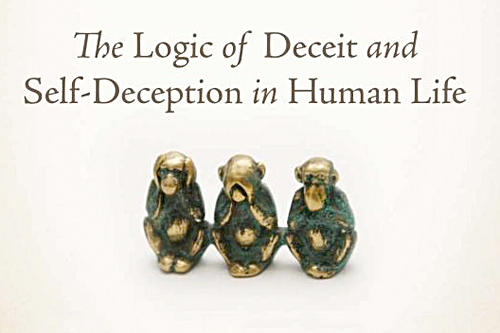Now in his seventies, Robert Trivers is no longer a prodigy but still acts the enfant terrible. He taught himself calculus when he was 14 and wrote and published a series of papers that revolutionized evolutionary theory when he was still a graduate student at Harvard. He was awarded the Crafoord Prize in Biosciences by the Royal Swedish Academy of Sciences (biology’s equivalent of the Nobel Prize) and has been hailed as a genius by a who’s who of well-known scientists—not a few of whom he went on to feud with. As brilliant as Trivers is, he is famously volatile; he has never acted the role of the distinguished professor.


The Folly of Fools: The Logic of Deceit and Self-Deception in Human Life (Basic Books), his magnum opus, is a general theory of the evolutionary role of deceit and especially self-deceit. It ranges widely across the fields of biology, neurophysiology, anthropology, psychology, immunology, genetics, sociology, religion, history, and politics to show how prevalent lying is, whether in the blister beetle, a tiny bee parasite that clusters in groups of hundreds of thousands to mimic the size, color, and perching location of a female bee to attract male hosts, or in human beings’ penchant for lying to themselves, whether by overestimating one’s own capabilities (something men are especially prone to do, which yields consistent benefits in the mating market but can be disastrous for society at large) or projecting our guilt onto others (laboratory tests have confirmed that many homophobes harbor homosexual tendencies). The better we can fool ourselves, the better we can fool others.
Many of us can so thoroughly convince ourselves that a sugar pill a doctor gives us has the power to help us that it does just that (though interestingly enough, profoundly depressed people are immune to the placebo effect, very likely because their disease robs them of the ability to feel hope). Faith—even if it’s faith in something that isn’t objectively true—confers immunological advantages. Religiosity correlates with lower rates of parasitic infection and stronger immune function.
As a student of political extremism, I found Trivers’ analysis of cognitive dissonance fascinating. Why do people persist in believing the unbelievable—that Barack Obama is really a foreign-born Muslim or that George W. Bush deliberately and knowingly planned and executed 9/11? “Facts counter to one’s biases,” Trivers explains, “have a way of arousing one’s biases. This can lead to those with strong biases being both the least informed and the most certain in their ignorance. In one experiment, people were fed politically congenial misinformation and an immediate correction. Most people believed the evidence more strongly after the refutation.”
For all of Trivers’ erudition and serious-mindedness, his book has a very personal tone—and it is clearly driven by a highly personal agenda. Its blistering chapters on false historical narratives and warfare mince no words when it comes to, as Trivers puts it, the genocidal foundations of the United States or Zionism’s bad faith. Trivers writes frankly about his own many foibles, including his womanizing; his compulsion to commit petty thefts; his drinking, drug use, and gambling; his vanity; and his often self-destructive tendency to lash out at his colleagues.
“Living,” Trivers writes, “is like riding a train while facing backward. That is, we see reality only after it has passed us by. Neurophysiologists have shown that this is literally true. We see (consciously) incoming information, as well as our internal intention to act, well after the fact.”
When I started to write this piece, I Googled Trivers to see what he’s been up to since Folly of Fools was published in 2011. It didn’t take me long to learn that Rutgers University had suspended him from teaching. “Trivers has a long and complex history at Rutgers,” the Newark Star Ledger reported on February 11, 2014. “In 2012, he was told to stay off campus for five months following several confrontations, including a heated argument with another professor…. He also made headlines when he reported another professor had used flawed data in a paper they co-authored in the journal Nature.”
For better or for worse, Trivers is wired to be Trivers. “Our genes do not change,” he writes, “although their expression patterns may. If they continue to act in the same way, we may experience this as a compulsion we are unable to change.”
“Living,” he writes elsewhere, “is like riding a train while facing backward. That is, we see reality only after it has passed us by. Neurophysiologists have shown that this is literally true. We see (consciously) incoming information, as well as our internal intention to act, well after the fact.”
But—and this is why I think his book is so important and so powerful—if deception and self-deception have been favored by natural selection, that doesn’t mean we should accept them. As gullible and deceptive as we are, humans are blessed with the gift of consciousness. “More deception is not something I favor,” Trivers writes. “I do not believe in building one’s life, one’s relationships, or one’s society, on lies.”
The antidote for mindlessness that he offers is mindfulness. “Mindful meditation can produce long-term benefits in both mood and immune function,” he writes. And although he is not a modest man (“I don’t want to sound immodest, but I am one of the greatest social theorists in evolutionary biology alive, period,” he told the Rutgers student newspaper during one of his controversies), he appreciates both the virtue and the utility of humility. “Meditation and prayer may also be used against self-deception directly, but this may depend very much on the kind of prayer we use…. If we really want to learn from experience…we need much deeper confrontations with ourselves and our inadequacies, ones often drenched in tears and humility.”




2 Comments
Jeffrey Rubin
Thanks for an interesting and informative piece, Arthur.
Xandrea
Great article.